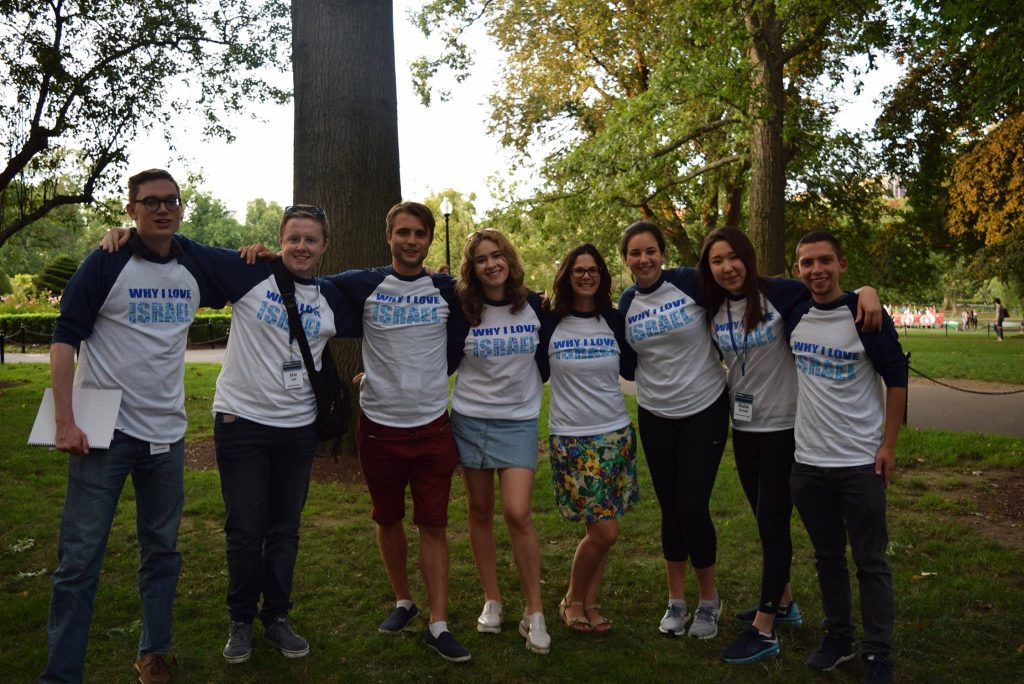At CAMERA’s 2017 Student Leadership Conference, young activists from around the world came together to learn about making a positive difference for Israel on campus. With 13 countries represented, we had a variety of perspectives contributing to constructive discussions.
Speaking to students from countless different campuses at the conference was also a chance to reflect on the collective successes in London from my own perspective. To many internationally, our year in London may have seemed as if it was filled with attacks and intimidation. However, despite the violent protest facing Hen Mazzig when he came to speak at University College London (UCL) in October 2016, we continued on with our programming for the year as normal. We did not let the actions of extreme, divisive anti-Zionist activists overshadow our efforts to make constructive changes to the situation on campus. We continued to hold events and start initiatives, including reaching out to new students. During Israel Apartheid week, we actively went about starting conversations with hundreds of students in London, beginning with falafel and cake but ending in positive dialogue and even new friendships.

At hostile events, like when UCL Friends of Palestine hosted renowned anti-Zionist academic Ilan Pappe, we proactively started conversations to represent our own opinions. Pappe and other speakers used snide remarks, conspiracy theories and intimidation to convince the audience that Zionism was a racist endeavour. After the event, students stayed behind for hours to talk to us, as they were curious to hear a perspective which even they realised hadn’t been equally represented at the event. However, if we had not attended the event to show our outrage at the way we were mis-represented, the students could have left with a very different impression. Our greatest successes this past academic year have been when we take initiative and go out to speak to others and represent ourselves.
The CAMERA conference was also an opportunity to hear from other inspiring students who had great success on their campuses over the past academic year. The theme of the conference above all was that Israel activism is not just about taking a defensive position- but rather, about actively educating others. Even on campuses in the US where BDS campaigns have yet to spring up, students are taking proactive action by creating new Israel groups with the support of CAMERA. When you initiate the conversation about Israel on campus, you can create a positive representation of Israeli society, as well as opening up opportunities for dialogue on neutral terms. In the UK, we are often too worried about bringing up the topic of Israel on campuses where the Palestinian society is dormant, for fear of the backlash it could have for Jewish students. However, now more than ever, the atmosphere is right for spearheading proactive discussion about Israel.
On British campuses, students of today are tiring of a focus on radical activities which discredit university politics as a minefield of extreme activists focusing on irrelevant issues. Tom Harwood’s strong contention for the NUS presidency and growing political movements for freedom of speech show that things are changing on UK campuses. Students want to be able to discuss issues in a civilised manner without descending into either radical boycott campaigns or excessive political correctness. We should use this opportunity to show that engaging with Israel in student politics is not about polarised debates and violent protests. It is about creating dialogue and a positive atmosphere for debate and engagement with the Middle East on campus.
We now have a unique opportunity to change the way student debates are framed by making civil conversations a highlight of our activity. Last academic year, we got past the fear of making people feel uncomfortable with our Zionist identities. We approached Zionism as it is, a legitimate movement for the national self-determination of the Jewish people.
This year, we must continue to define the debate on our own terms.
Contributed by UK Campus Associate Tamara Berens.
This article was originally published in Jewish News.

